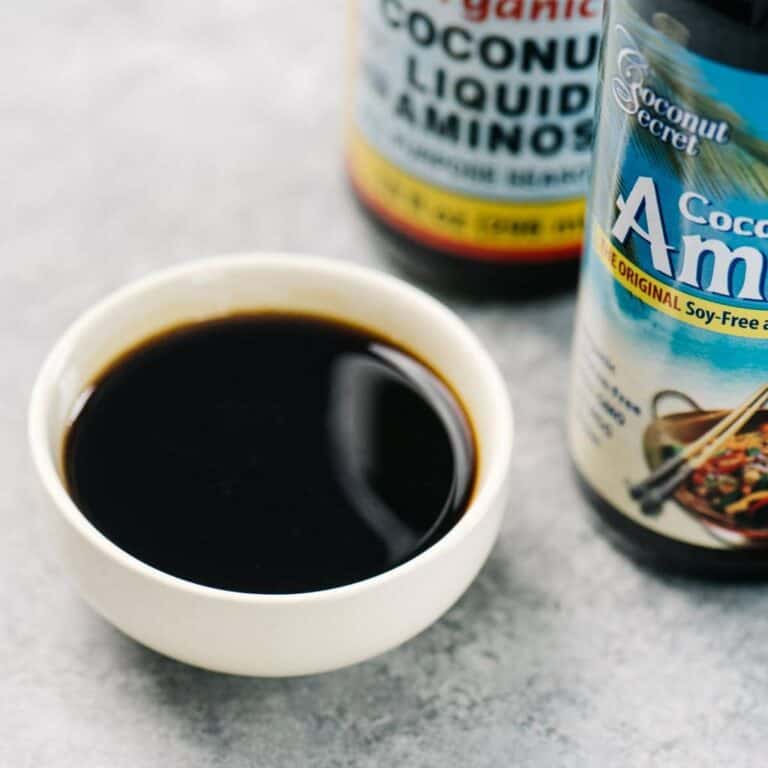Can Fish Sauce Replace Oyster Sauce? Which One is Better?

Are you ready to embark on a culinary journey through the tantalizing world of Asian flavors? In the realm of Asian cuisine, sauces hold the power to elevate dishes from ordinary to extraordinary. Infusing them with depth and complexity. Two heavyweights in this saucy arena are fish sauce and oyster sauce, each with its own distinct allure. But the burning question remains: can fish sauce replace oyster sauce, and which one reigns supreme?
Prepare your taste buds for a delightful exploration as we delve into the aromatic depths of fish sauce and oyster sauce. These savory condiments originate from Southeast Asia and southern China. Both have long captivated the palates of chefs and food enthusiasts worldwide. With their umami-packed flavors and rich culinary traditions, these sauces bring a touch of authenticity to beloved dishes.
Join us as we uncover the unique flavor profiles, nutritional values, and culinary applications of fish sauce and oyster sauce. We’ll examine their distinct qualities and offer insights into whether one can stand in for the other. So, grab your apron and let’s embark on a flavorful adventure to determine which sauce reigns supreme in your kitchen.
Understanding Fish Sauce
Fish sauce, a staple in Southeast Asian cuisine, is made from fermented fish or krill. It has a pungent aroma and a rich umami flavor. While it may not sound appealing at first, its potent taste transforms dishes when used in the right proportions. Fish sauce is commonly found in Thai, Vietnamese, and Filipino recipes, adding an authentic touch to the flavors of these cuisines.
Fish Sauce Flavor Profile
Fish sauce boasts a salty, briny taste with hints of sweetness and a distinct umami quality. It adds depth and complexity to dishes, enhancing the flavor. The fermented fish is an essential ingredient in many Southeast Asian dishes like pad Thai, Vietnamese pho, and green papaya salad.
Nutritional Value
In terms of nutritional value, fish sauce is low in calories and fat while being rich in protein. However, it’s important to note that fish sauce is high in sodium, so it should be used judiciously, especially for those watching their sodium intake.
Read: Is Fish Sauce Sour?
Unveiling Oyster Sauce

Oyster sauce, on the other hand, is a thick and savory condiment made from oysters, soy sauce, sugar, and other seasonings. Originating from southern China, it has gained popularity worldwide. It is a key ingredient in Chinese, Thai, and Cantonese cuisine.
Oyster Sauce Flavor Profile
Oyster sauce has a deep, earthy flavor with a touch of sweetness. It is known for its velvety texture and the umami richness it brings to dishes. With its balanced savory notes, oyster sauce compliments stir-fries, noodle dishes, and even marinades.
Nutritional Value
Similar to fish sauce, oyster sauce is low in calories and fat. It contains essential minerals such as iron, calcium, and zinc, which contribute to a healthy diet. However, oyster sauce may contain small amounts of shellfish allergens, so individuals with shellfish allergies should exercise caution or choose alternatives.
Can Fish Sauce Replace Oyster Sauce?
Now, the burning question arises: can fish sauce replace oyster sauce in recipes? While both sauces provide a distinct taste to dishes, they are not interchangeable due to their unique flavor profiles.
However, it is possible to substitute fish sauce for oyster sauce in certain situations, but the dish may have a slightly different taste.
Fish sauce can be used as a potential substitute for oyster sauce in certain recipes, but there are a few things to keep in mind. Oyster sauce has a distinct sweet and savory flavor that fish sauce cannot fully replicate.
For vegetarian or vegan diets, fish sauce can be replaced with a combination of soy sauce, mushroom sauce, and a touch of sugar. These ingredients mimic the umami depth of oyster sauce.
In contrast, if you’re seeking an alternative to fish sauce, oyster sauce is not the ideal choice. This is due to its prominent oyster flavor. A combination of soy sauce, Worcestershire sauce, and a dash of sugar may better capture the essence of fish sauce while providing a suitable substitute.
Sauces Substitution Tips
Here are some tips to consider when substituting fish sauce for oyster sauce:
- Experiment with ratios: Fish sauce is typically saltier than oyster sauce, so start with a smaller quantity and gradually adjust to achieve the desired flavor.
- Balance the sweetness: Oyster sauce tends to be sweeter than fish sauce. If the recipe calls for sweetness, consider adding a bit of sugar or a sweetener of your choice to maintain the flavor balance.
- Consider the aroma: Oyster sauce has a milder aroma compared to fish sauce. If the dish relies heavily on the fragrance of oyster sauce, adding a small amount of finely minced garlic or shallots can help replicate the aroma.
- Add additional umami sources: If you’re using fish sauce as a substitute for oyster sauce, you may want to enhance the umami flavor. Consider adding ingredients like soy sauce, mushroom powder, or even a dash of Worcestershire sauce to amplify the savory notes.
- Test and adjust: As with any substitution, it’s essential to taste and adjust as you go. Start by using a smaller amount of fish sauce, and gradually increase if needed. Remember, the goal is to achieve a balanced and delicious result.
Which One Is Better?
Determining which sauce is better, fish sauce or oyster sauce, ultimately depends on personal preference and the specific dish you’re preparing. Each sauce brings its own unique flavor and character to the table, enhancing different types of cuisine.
Fish sauce excels in Southeast Asian dishes, where its pungent and tangy flavor shines through. It adds a distinct umami punch to recipes like Thai curries, Vietnamese dipping sauces, and Filipino adobo. The boldness of fish sauce is well-suited for those who enjoy robust and intense flavors.
On the other hand, oyster sauce offers a more balanced and subtly sweet taste. Its velvety texture and rich umami notes make it a versatile ingredient in various stir-fries, noodle dishes, and marinades. Oyster sauce appeals to those who prefer a milder, more harmonious flavor profile.
Ultimately, both fish sauce and oyster sauce have their rightful place in the culinary world. It’s worth having both sauces in your pantry. They serve different purposes and can elevate your cooking in distinct ways.
Expert Opinions and Chefs’ Recommendations

Culinary experts and chefs often have their own preferences and recommendations when it comes to fish sauce and oyster sauce. Some chefs may favor the bold umami flavor of fish sauce and use it extensively in their Asian-inspired dishes.
Others may appreciate the caramelized sweetness and versatility of oyster sauce in Chinese cuisine. Ultimately, personal taste and the specific recipe’s requirements play a significant role in determining which sauce to use.
However, many chefs emphasize the importance of using high-quality fish sauce or oyster sauce to achieve the best results. The quality of the sauce can greatly impact the overall flavor and authenticity of the dish.
Considerations for Dietary Restrictions and Preferences
For individuals with dietary restrictions or preferences, there are a few factors to consider when using fish sauce or oyster sauce.
Vegetarian/Vegan: Traditional fish sauce and oyster sauce are not suitable for vegetarian or vegan diets. It is obvious: due to their animal-derived ingredients. However, vegetarian alternatives, such as mushroom-based or soy-based sauces. Both can be used to mimic the flavors of fish sauce or oyster sauce in recipes.
Gluten-Free: Fish sauce and oyster sauce are generally gluten-free, but you need to check the labels of commercially available sauces. Some brands may include gluten-containing ingredients.
Final Verdict and Personal Preference
In the debate between fish sauce and oyster sauce, it’s a matter of personal preference for the dish being prepared. Both sauces offer unique flavors and have their place in various cuisines. If you enjoy the umami-rich, slightly fishy taste, fish sauce may be your go-to option. On the other hand, if you prefer a sweeter, caramelized flavor, oyster sauce might be more to your liking.
Experimenting with different recipes and sauces can help you develop your culinary style and discover new flavor combinations. Don’t be afraid to explore and find the perfect balance of sauces that suit your taste buds.
Summary
In conclusion, while fish sauce and oyster sauce share some similarities, they have distinct flavors that cannot be easily interchanged. Fish sauce brings a tangy, pungent umami flavor to Southeast Asian dishes, while oyster sauce offers a more balanced and subtly sweet taste with velvety richness.
When considering substituting one for the other, understand the unique characteristics of each sauce. Then make adjustments accordingly. Experimentation is key to finding the right balance and achieving the desired flavor in your recipes.
As you explore the world of flavors and culinary possibilities, both fish sauce and oyster sauce have unique qualities to offer. Whether you prefer the umami kick of fish sauce or the sweet complexity of oyster sauce, these sauces can transform your dishes into delightful culinary experiences. Embrace experimentation, follow your taste preferences, and enjoy the journey of discovering the flavors that best suit your palate.
So, the next time you’re in the kitchen, don’t hesitate to reach for fish sauce or oyster sauce, depending on the cuisine and flavor profile you wish to create. Embrace their individuality, and let these delightful sauces take your dishes to new culinary heights. Happy cooking!
Frequently Asked Questions (FAQs)
Is fish sauce vegetarian-friendly?
Fish sauce is not vegetarian-friendly as it is made from fermented fish. However, there are vegetarian alternatives available.
Can oyster sauce be used as a replacement for fish sauce in recipes?
Oyster sauce may not be the ideal replacement for fish sauce due to its distinct flavor profile. It can add a savory element to dishes but doesn’t fully capture the unique umami depth of fish sauce. Using a combination of soy sauce, Worcestershire sauce, and a touch of sugar may be a better alternative.
Does fish sauce have a strong fishy taste?
Fish sauce does have a distinct fishy taste and aroma. When used in moderation and combined with other ingredients, its flavor becomes more balanced and enhances the overall umami profile of dishes.
How long do oyster sauce and fish sauce last after opening?
Both fish sauce and oyster sauce have a long shelf life and can last for several months, even after opening. It is advisable to store them in a cool, dark place away from direct sunlight. However, it’s always a good idea to check the expiration date and follow the manufacturer’s guidelines for optimal usage.
Are fish sauce and oyster sauce gluten-free?
In general, fish sauce and oyster sauce are gluten-free. However, it’s important to read the labels and check for any potential gluten-containing additives or variations among different brands.
Can fish sauce or oyster sauce be used in non-Asian cuisines?
Fish sauce and oyster sauce are commonly associated with Asian cuisine. They can also be used to add depth and flavor to non-Asian dishes. Experimenting with these sauces in marinades, dressings, or as a secret ingredient can elevate the taste of various cuisines.
Which sauce is more commonly used in Thai cuisine: fish sauce or oyster sauce?
Fish sauce is the most commonly used sauce in Thai cuisine. It serves as a fundamental ingredient in many Thai dishes, providing the signature umami flavor that Thai cuisine is known for. Oyster sauce, although not as prevalent, may be used in specific Thai recipes that call for its distinct sweet and savory notes.





